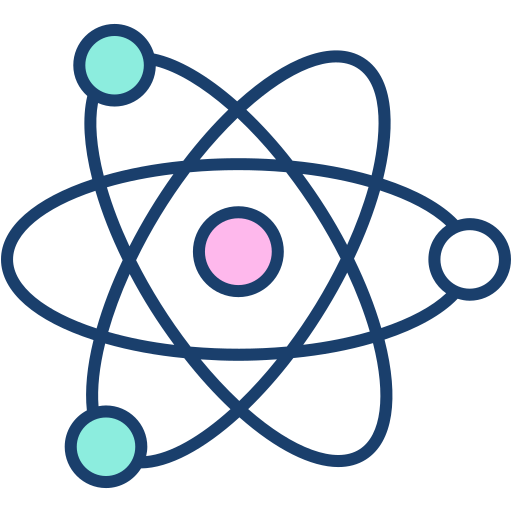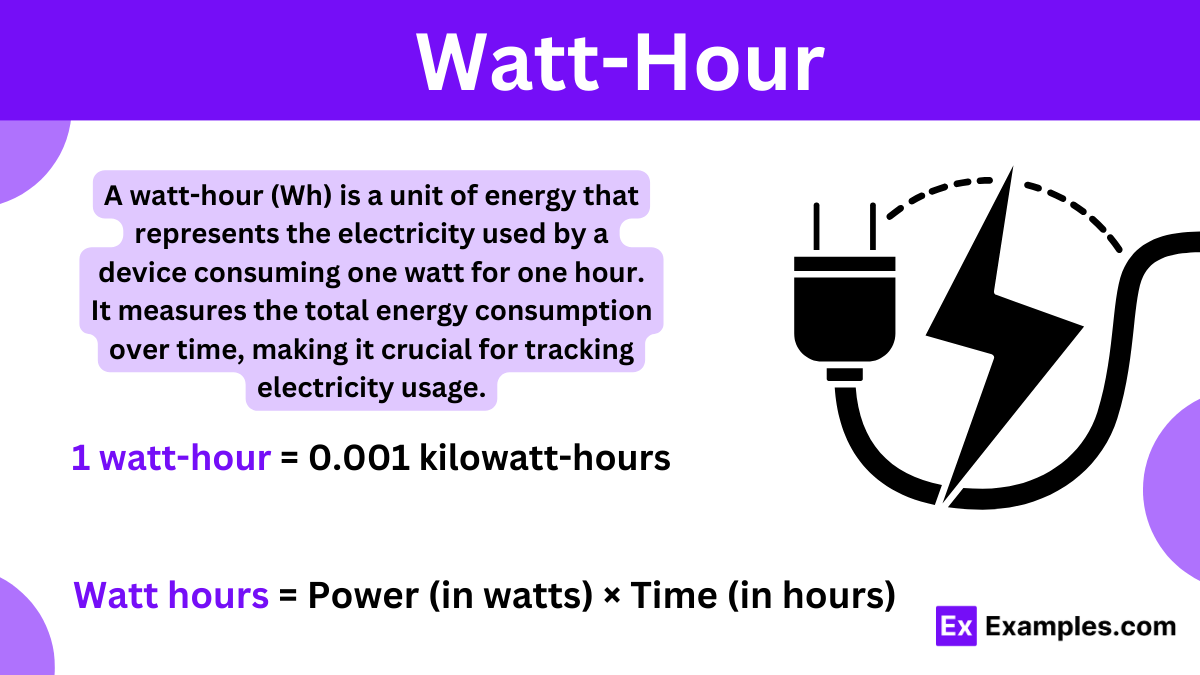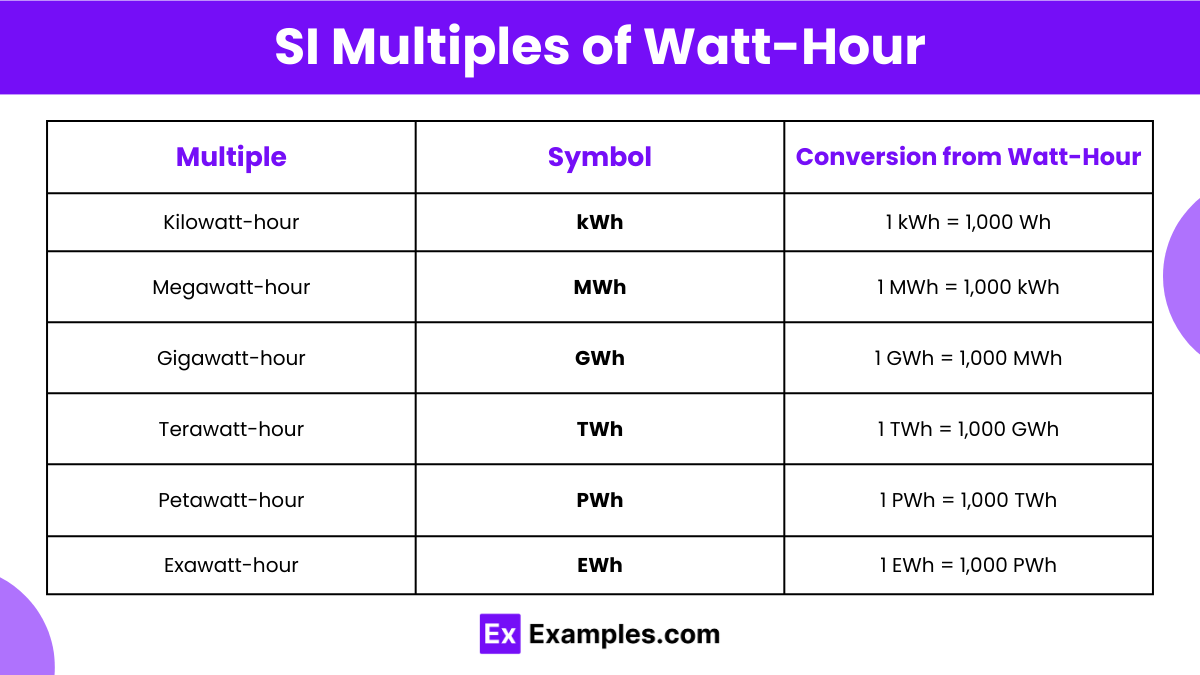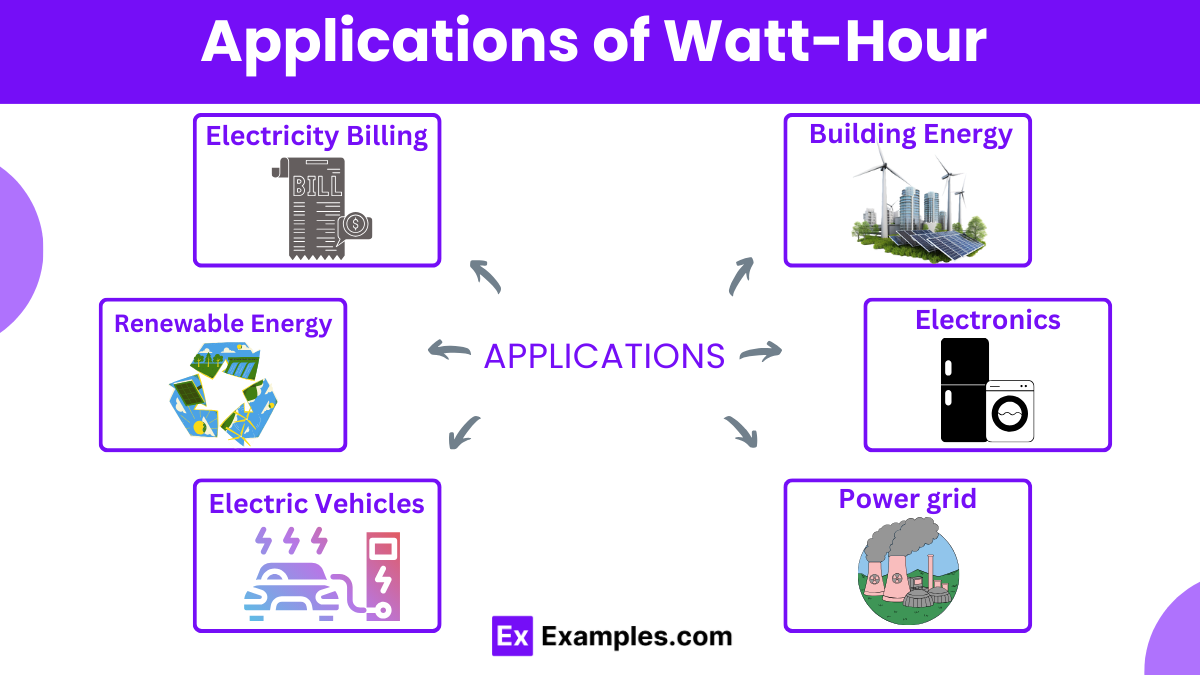What is a watt-hour (Wh) a measure of?
Power
Energy
Voltage
Current


The formula to calculate watt hours is straightforward:
Watt hours=Power (in watts)×Time (in hours)
The watt hour (Wh) is a unit that measures how much energy an electrical device uses over time. Understanding this connection is essential for both everyday energy management and broader energy planning.
Energy is simply the capacity to do work, such as heating your home or powering your TV. In terms of electricity, it refers to how much electric power is used over a certain amount of time. The watt hour is the unit that measures this use.
How Watt Hour Measures Energy:
A watt is a unit of power indicating the rate of energy usage. When you multiply this power by the time during which the power is utilized, you obtain energy in watt hours. For instance:
This straightforward calculation of watt hours allows us to track and quantify energy usage accurately, aiding in everything from monitoring daily electricity use to evaluating the energy efficiency of different devices. Understanding watt hours is vital for anyone looking to get a grip on their energy consumption, whether for cost control, efficiency improvements, or environmental considerations.
Practical Implications:
Watt-hours play a crucial role in understanding the power available in batteries and measuring energy usage in electrical devices.
1. Battery Power Calculation: Watts represent the energy flowing in a circuit, calculated by multiplying voltage (V) by amperes (A). For example, a battery rated at 12 volts and 10 amp hours (Ah) yields 120 watt-hours (Wh) of energy (12V x 10Ah = 120Wh).
2. Battery Capacity and Life: Watt-hours help measure battery capacity and estimate battery life. By knowing the watt-hour rating, users can understand how many times a battery can recharge a device.
3. Comparing Battery Performance: Watt-hours provide a metric for comparing battery performance. Higher watt-hour ratings indicate greater energy storage capacity and longer battery life.
4. Solar Panel Efficiency: Watt-hours are also used to measure how much energy a solar panel can produce. This information helps users assess the effectiveness of solar energy systems.
5. Energy Usage of Electrical Devices: Watt-hours are used to determine the energy usage of electrical devices over time. This information is valuable for understanding power consumption patterns and planning energy-efficient practices.
6. Enhancing Energy Efficiency: Understanding watt-hours helps users identify energy-intensive devices and replace them with more energy-efficient alternatives. This not only reduces electricity bills but also enhances overall energy efficiency and sustainability.
Converting watt-hours into various energy units is essential for applications across different fields such as physics, engineering, and nutrition. Below is a table that provides the conversions from watt-hours to several other common units, including joules, which can then be used to calculate calories.
| Unit | Conversion Factor | Example Conversion |
|---|---|---|
| Joules (J) | 1 watt-hour = 3,600 joules | 1 Wh = 3,600 J |
| Kilowatt-hours (kWh) | 1 watt-hour = 0.001 kilowatt-hours | 10 Wh = 0.01 kWh |
| Megajoules (MJ) | 1 watt-hour = 0.0036 megajoules | 1,000 Wh = 3.6 MJ |
| British Thermal Units (BTU) | 1 watt-hour = 3.412 BTU | 100 Wh = 341.2 BTU |
| Calories (cal) | 1 watt-hour = 860.421 calories | 1 Wh = 860.421 cal |
| Kilocalories (kcal) | 1 watt-hour = 0.860421 kilocalories | 100 Wh = 86.0421 kcal |
Joules are the standard unit for energy in the science world. If you use a one-watt device like a small LED light for one second, that’s one joule. It’s a small amount, so we often talk about thousands or millions of joules for bigger things.
Kilowatt-hours are what your home electricity usage is measured in. If you run a heater that uses 1,000 watts (1 kilowatt) for an hour, that’s one kilowatt-hour. This is the unit you’ll see on your electricity bill.
Megajoules are bigger units of joules. One megajoule is a million joules. It’s used to describe larger amounts of energy, like the energy in a barrel of oil or the total energy your home uses in a day.
British Thermal Units measure heat energy. One BTU is the amount of heat needed to warm up one pound of water by one degree Fahrenheit. It’s commonly used in the United States, especially for appliances like air conditioners and furnaces.
Calories (small ‘c’) are tiny units of energy mostly used to measure the energy in food. It’s the energy needed to heat one gram of water by one degree Celsius. But, in food, we use Kilocalories (big ‘C’ as in Calories), where one Kilocalorie is 1,000 calories. This is what you actually see on food labels and when people talk about the calories in food.

The watt-hour (Wh) is a derived unit of energy used to measure electricity consumption. It can be scaled using standard SI prefixes to express various levels of energy consumption. Below is a table outlining these multiples for easier reference:
| Multiple | Symbol | Conversion from Watt-Hour | Description |
|---|---|---|---|
| Kilowatt-hour | kWh | 1 kWh = 1,000 Wh | Commonly used for household electricity billing. |
| Megawatt-hour | MWh | 1 MWh = 1,000 kWh | Used for larger buildings or industrial energy use. |
| Gigawatt-hour | GWh | 1 GWh = 1,000 MWh | Suitable for regional energy consumption tracking. |
| Terawatt-hour | TWh | 1 TWh = 1,000 GWh | Used for national energy statistics and policy. |
| Petawatt-hour | PWh | 1 PWh = 1,000 TWh | Applied in large-scale energy research and assessment. |
| Exawatt-hour | EWh | 1 EWh = 1,000 PWh | Used for global or extremely large-scale energy analysis. |
| Feature | Watt (W) | Watt-Hour (Wh) |
|---|---|---|
| Unit Type | Power | Energy |
| Definition | Measures the rate of energy use or transfer at any moment. | Measures the total amount of energy used over time. |
| Usage | Indicates how much energy an electrical device consumes per unit time when operating. | Quantifies the total energy consumed when an electrical device operates over a specific duration. |
| Example | A 60-watt light bulb uses 60 watts of power as long as it is turned on. | A 60-watt light bulb running for 2 hours uses 120 watt-hours of energy. |
| Measurement | Instantaneous | Cumulative |
| Practical Application | Used to determine the power requirement of appliances and to gauge how powerful a device is. | Used for electricity billing, assessing long-term energy consumption, and energy efficiency calculations. |
| Units Related | Related to kilowatts (1,000 watts), megawatts (1,000,000 watts) for higher power ratings. | Related to kilowatt-hours (1,000 watt-hours), megawatt-hours (1,000,000 watt-hours) for larger energy measurements. |

The watt-hour (Wh) is a unit of energy that has widespread applications in daily life and across various industries. Here’s an easy-to-understand overview of where and how watt-hours are used:
Electricity Billing
Watt-hours are essential for calculating your electricity bill. Utility companies measure how much electricity you use in watt-hours (or kilowatt-hours for larger amounts). This helps them determine how much to charge you based on your energy usage.
Managing Building Energy
In buildings, whether they’re homes, offices, or factories, watt-hours help track how much energy is used by systems like heating, air conditioning, and lighting. This information can identify where energy might be wasted and where improvements can be made to save energy and reduce costs.
Renewable Energy
For renewable energy sources like solar panels and wind turbines, watt-hours measure how much electricity is generated. This helps to understand how well these systems are working and how they contribute to energy needs.
Electric Vehicles
Electric vehicles (EVs) have batteries that store energy in watt-hours. The battery capacity, often given in kilowatt-hours, shows how far the car can travel on a full charge. This is crucial for managing battery life and planning trips efficiently.
Consumer Electronics
Devices like laptops and mobile phones also have their battery capacities measured in watt-hours. This tells you how long your device can run before it needs to be recharged, helping you manage your usage throughout the day.
Appliance Energy Efficiency
Watt-hours are used to rate the energy efficiency of appliances. Programs like Energy Star assess appliances, such as refrigerators and washers, based on their energy use in watt-hours under typical usage conditions. This helps consumers choose products that use less energy and save money on utility bills.
Grid Management
For energy providers, watt-hours are crucial for managing the power grid. They use this measure to predict how much electricity will be needed at different times and to adjust the supply accordingly to prevent blackouts and ensure the grid remains stable.
A watt-hour (Wh) is a unit of energy that represents the energy used by a device consuming one watt of power for one hour. It measures the cumulative energy consumption over time, providing a straightforward way to understand how much electricity various devices use when they’re running.
The formula to calculate watt-hours is simple:
Watt-hours=Power in watts×Time in hours
This formula helps to determine the total energy usage of an electrical device based on its power consumption and the duration it operates.
When we say something uses 60 watt-hours, it means that the device has consumed 60 watts of energy in one hour, or any equivalent combination that multiplies to 60. For example:
In each case, the total energy consumed amounts to 60 watt-hours. This measurement is particularly useful for understanding the energy consumption of appliances and gadgets, helping in energy management and cost estimation.
Text prompt
Add Tone
10 Examples of Public speaking
20 Examples of Gas lighting
What is a watt-hour (Wh) a measure of?
Power
Energy
Voltage
Current
How many watt-hours are in 1 kilowatt-hour (kWh)?
10
100
1000
10000
A device uses 50 watts of power for 2 hours. How much energy has it consumed?
25 Wh
50 Wh
75 Wh
100 Wh
What is the definition of a watt-hour?
A measure of power over time.
A measure of energy consumption.
A measure of current over time.
A measure of voltage over time.
If an appliance uses 1,500 watts of power, how many watt-hours will it use in 2 hours?
2,500 watt-hours
3,000 watt-hours
3,500 watt-hours
4,000 watt-hours
Which of the following is equivalent to 1 kilowatt-hour?
100 watt-hours
1,000 watt-hours
10,000 watt-hours
100,000 watt-hours
Which of the following represents the energy consumption of a device using 200 watts for 6 hours?
800 watt-hours
1,000 watt-hours
1,200 watt-hours
1,400 watt-hours
How many watt-hours are consumed by a 75-watt fan running for 8 hours?
400 watt-hours
500 watt-hours
600 watt-hours
800 watt-hours
If a microwave oven uses 1,200 watts, how many watt-hours does it consume in 30 minutes?
300 watt-hours
600 watt-hours
900 watt-hours
1,200 watt-hours
A 40-watt light bulb is used for 25 hours. How many watt-hours does it use?
500 watt-hours
800 watt-hours
1,000 watt-hours
1,200 watt-hours
Before you leave, take our quick quiz to enhance your learning!

